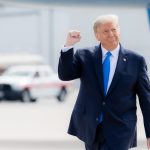Kamala Harris is gearing up to dance her way through some economic data just in time for the general election, seemingly oblivious to the fact that most voters aren’t buying her cha-cha. With inflation dipping from its peak and a steady unemployment rate, she wants to use the Federal Reserve’s potential interest rate cut as her golden ticket to win over voters. Spoiler alert: it’s unlikely to work. Poll numbers show that former President Donald Trump still has the upper hand with voters prioritizing economic issues, as a whopping 86 percent of those focused on jobs and the economy plan to vote for him, compared to Harris’ 64 percent. If anything, those numbers suggest that Harris should be more worried about her campaign’s viability than celebrating any minor economic shifts.
As inflation drops, the Biden-Harris duo might issue some half-hearted cheers, but the public sentiment isn’t turning in their favor anytime soon. Even though the Bureau of Labor Statistics recently reported an annual inflation rate of 2.5 percent—declining from July’s 2.9—most Americans are still experiencing the financial hangover from the previous administration. In terms of inflation specifically, Biden’s approval rating is a dismal 34.3 percent, with more than 62 percent of the American people expressing their disapproval of his handling of the situation. Thanks to such stellar numbers, Harris’ treasury of talking points might just be worth less than a shiny penny in the eyes of the electorate.
Little space for Harris to flip script on economy despite talk of Fed rate cuts, experts say https://t.co/YOlxcyrEhd
— John Solomon (@jsolomonReports) September 13, 2024
The upcoming interest rate cut, while expected, might give the stock market a little sugar rush. However, some economic pundits remain skeptical about how much difference it will genuinely make for everyday voters. Former Trump advisor Steve Moore noted that a rate reduction might only lead to some temporary euphoric jumps in the stock market but won’t address the deeper issues plaguing voters’ wallets. Many people realize that the Democrats’ solution of slashing rates feels more like a pre-election gimmick rather than a sincere effort to improve their financial reality.
While Harris may use a successful interest rate cut as a weapon against Trump in debate scenarios, industry analysts doubt that even a market surge could sway deep-seated voter cynicism. A seasoned pollster remarked that many would instinctively suspect that the Democrats are merely engaging in this economic sleight of hand to divert attention from their pandemic-driven track record. After all, nothing screams authenticity like a sudden economic favor right before an election.
It’s difficult to overlook the fact that despite the encouraging economic stats, voters are still feeling the pinch. With food and rent prices still on the rise, the average American is understandably skeptical about the administration’s claims of economic improvement. The winds of change aren’t blowing in Harris’s direction, and the chances of her winning over fiscally minded voters remain slim, even with a few favorable economic tweaks. A senior strategist noted that the debate barely touched on econ-centric topics that seriously matter to undecided voters. Harris is consistently focused on less critical issues. At the same time, Trump dominates the economic narrative; her predicament becomes clearer. If she can’t convince the electorate of her financial prowess, she may very well need a more convincing act for her campaign magic show.




